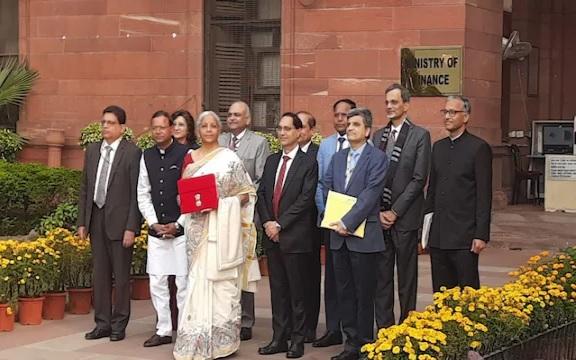
New Delhi: Finance Minister Nirmala Sitharaman on Saturday (February 1) presented her eighth consecutive Union Budget amid protests and walkouts from the Opposition. The Budget, approved by the Cabinet headed by Prime Minister Narendra Modi before its presentation, aims to implement reforms across six domains: Taxation, Power, Urban Development, Mining, Financial Sector, and Regulatory Reforms.
Sitharaman continues with the tradition she set in 2019, carrying the Budget speech in a traditional 'bahi-khata' instead of the colonial-era briefcase, and later replacing physical papers with a digital tablet in 2021. Before heading to Parliament, she met President Droupadi Murmu at Rashtrapati Bhavan, where the President offered her 'dahi-chini' (curd-sugar), considered auspicious. The President extended her best wishes to the Finance Minister and her team for the Budget presentation.
Key Announcements and Tax Reforms
Sitharaman reaffirmed the commitment of the tax department to a policy of 'Trust First and Scrutinise Later.' She also announced a significant relief for millions of India's poor by increasing the income tax exemption limit. Under the new regime, there will be no income tax payable up to Rs 12 lakh, and Rs 12.75 lakh including standard deductions. Additionally, she confirmed that the new income tax bill would be introduced next week, detailing further reforms to direct and indirect taxes.
According to sources, a new direct income tax code might be introduced in the ongoing Parliament session. The 1961 Income Tax Act, which currently consists of 23 chapters and 298 sections, is set to be overhauled. The government aims to simplify income tax laws, reducing the length of the Act by 60%. The Central Board of Direct Taxes (CBDT) had set up an internal committee with 22 sub-committees to evaluate various aspects of the old law, and by January, the government had received around 7,000 recommendations from the public and stakeholders.
Opposition’s Reaction and Criticism
The Opposition criticized the Budget, claiming it lacked provisions for the common people and the middle class. Samajwadi Party MPs, including Akhilesh Yadav, walked out of Lok Sabha, demanding the government release a list of those who lost their lives in the Mahakumbh stampede.
Trinamool Congress leader and Lok Sabha MP Abhishek Banerjee claimed that the Budget was designed with the upcoming Bihar elections in mind. "Last time, all announcements were for Andhra Pradesh and Bihar. Andhra elections are over, now Bihar is in focus," he remarked, adding that West Bengal had not received any major allocations in the last ten years. DMK MP Dayanidhi Maran also criticized the Budget, calling it a "big letdown," particularly for the middle class. He pointed out the contradiction in Sitharaman’s tax announcements, stating that although tax exemption was raised to Rs 12 lakh, a 10% tax slab still applied for incomes between Rs 8 to 10 lakh.
Economic Outlook and Growth Projections
The Budget provides a roadmap for the Modi government's vision of making India a 'Viksit Bharat' by 2047. The economy, however, is expected to slow down to 6.4% in the current financial year. While the government has outlined measures to boost economic growth, the Opposition remains skeptical about their impact, particularly on the middle class and non-priority states.
As the debate over the Budget continues in Parliament, the new tax reforms and economic policies will be closely scrutinized in the coming weeks, especially as the government prepares to introduce the new income tax bill in the next session.
